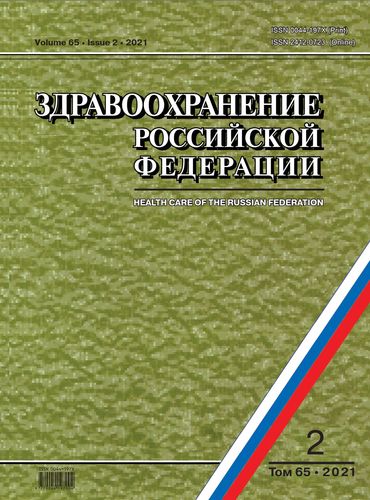Some aspects of the theory of errors of doctors
- Autores: Makhambetchin M.M.1, Shakeyev K.T.2
-
Afiliações:
- Scientific and Research Institute of Traumatology and Orthopedics of the Republic of Kazakhstan
- Karaganda Medical University
- Edição: Volume 65, Nº 2 (2021)
- Páginas: 159-165
- Seção: DISCUSSION
- ##submission.dateSubmitted##: 25.10.2024
- URL: https://hum-ecol.ru/0044-197X/article/view/637742
- DOI: https://doi.org/10.47470/0044-197X-2021-65-2-159-165
- ID: 637742
Citar
Texto integral
Resumo
The development of clinical thinking and the improvement of medical care largely depend on doctors and society’s attitude to medical errors. A balanced, rational perspective to medical errors is critical with an understanding of the main aspects of medication errors. The paper presents two important aspects of the problem of medical errors – their probability and, in a sense, their routine, as well as the role of collective relationships in shaping an objective attitude of doctors to errors.
The article argues that the correct action of a doctor does not mean that they are unmistakable. The factors that determine the complexity of medicine are listed.
The actual and ambiguous effectiveness of the medicine is considered.
It is argued that the development of evidence-based medicine is evidence of the relativity of knowledge in medicine. The basic variants of the relationship of doctors in the collective are given. The role of collegiality in improving the professional experience and quality of medical care is specified.
It has been shown that the absence of objective criteria of guilt or innocence of a doctor in error exacerbates the problem of errors. It emphasizes the flaw of equating all errors with misconduct and the unilateralism of such an approach in preventing mistakes. A vicious circle is presented, where the traditionally negative attitude towards doctors who made a mistake ultimately leads to concealment of errors, a decrease in the number and quality of error analysis, stagnation in the development of clinical thinking, an increase in the number of errors and, accordingly, the legal tightening of demand for medical errors.
Sobre autores
Murat Makhambetchin
Scientific and Research Institute of Traumatology and Orthopedics of the Republic of Kazakhstan
Autor responsável pela correspondência
Email: murat.makhambetchin@mail.ru
ORCID ID: 0000-0003-3743-5262
MD, Ph.D., Scientific and Research Institute of Traumatology and Orthopedics of the Republic of Kazakhstan, Nur-Sultan, 010009, Republic of Kazakhstan.
e-mail: murat.makhambetchin@mail.ru
RússiaKayrat Shakeyev
Karaganda Medical University
Email: noemail@neicon.ru
ORCID ID: 0000-0002-7802-1464
Rússia
Bibliografia
- National Center for Health Statistics (US). Health, United States, 2015: With Special Feature on Racial and Ethnic Health Disparities. Report No.: 2016-1232. Hyattsville, MD: National Center for Health Statistics (US); 2016.
- Makary M.A., Daniel M. Medical error-the third leading cause of death in the US. B.M.J. 2016; 353: i2139. https://doi.org/10.1136/bmj.i2139
- Grober E.D., Bohnen J.M. Defining medical error. Can. J. Surg. 2005; 48(1): 39–44.
- Rodziewicz T.L., Houseman B., Hipskind J.E. Medical error prevention. In: StatPearls. Treasure Island, FL: StatPearls Publishing; 2020.
- Robertson J.J., Long B. Suffering in silence: medical error and its impact on health care providers. J. Emerg. Med. 2018; 54(4): 402–9. https://doi.org/10.1016/j.jemermed.2017.12.001
- Groopman J. How Doctors Think. Boston: Houghton Mifflin; 2007.
- An V.K., Rivkin V.L., Solomka A.Ya. Dangers, Complications and Mistakes in Proctology [Opasnosti, oslozhneniya i oshibki v proktologii]. Moscow: Binom; 2014. (in Russian)
- Imrie R., Ramey D.W. The evidence for evidence-based medicine. Complement. Ther. Med. 2000; 8(2): 123–6. https://doi.org/10.1054/ctim.2000.0370
- An Introduction to Evidence – Based Practices; 2014. Available at: https://www.jrsa.org/pubs/reports/ebp_briefing_paper_april2014.pdf
- Tsimmerman Ya.S. Wise Thoughts about Medicine and Healing. Sayings, Aphorisms, Quotes [Mudrye mysli o meditsine i vrachevanii. Izrecheniya, aforizmy, tsitaty]. Moscow: Geotar-Media; 2014. (in Russian)
- Helo S., Moulton C.E. Complications: acknowledging, managing, and coping with human error. Transl. Androl. Urol. 2017; 6(4): 773–82. https://doi.org/10.21037/tau.2017.06.28
- Ward S., Outram S. Medicine: in need of culture change. Intern. Med. J. 2016; 46(1): 112–6. https://doi.org/10.1111/imj.12954
- Pinto A., Faiz O., Bicknell C., Vincent C. Surgical complications and their implications for surgeons’ well-being. Br. J. Surg. 2013; 100(13): 1748–55. https://doi.org/10.1002/bjs.9308
- Gallagher T.H., Waterman A.D., Garbutt J.M., Kapp J.M., Chan D.K., Dunagan W.C., et al. US and Canadian physicians’ attitudes and experiences regarding disclosing errors to patients. Arch. Intern. Med. 2006; 166(15): 1605–11. https://doi.org/10.1001/archinte.166.15.1605
- Newman M.C. The emotional impact of mistakes on family physicians. Arch. Fam. Med. 1996; 5(2): 71–5. https://doi.org/10.1001/archfami.5.2.71
Arquivos suplementares









